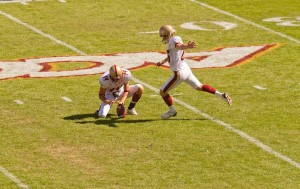Hire a Student-Athlete and Win Big

While cheating and special treatment do occur sometimes, most student-athletes complete their degrees knowing they will not continue to play professionally. A vast majority of student athletes play below the Division I level. In fact, 82 percent of colleges are categorized outside of Division I. Professional athletes can come out of any division, but athletes playing in Division II and below are typically out of the spotlight. Very few are projected to sign multimillion-dollar contracts. With only 1.7 percent of college football players playing professionally, the rest join the workforce grind to make a living like everyone else. If you are breezing over college athletic experience on resumes, think again. The student-athlete can be the best hiring decision you make all quarter.
Not All Fun and Games
Student athletes may not have a brand-name internship on their resume, but four years of college athletics is serious work experience. Dedicating time to the team, sport, and school takes sacrifice. Players can give as much as 40+ hours a week to their sport during the season. Time committed to the team can consist of games, practices, conditioning, lifting, rehab, treatment, meetings, meals, traveling, service, appearances, camps, youth-development, and anything else the coach puts on the schedule. The sport quickly transforms from an after-school activity into a full-time job.
Only 1 percent of high schoolers receive a full-ride athletic scholarship from a Division I school. The “charmed” life of a student-athlete at a big name school is very rare. All schools mandate a minimum GPA that is necessary to stay eligible, as well as a certain amount of credits to be finished each semester. The average student athlete has put in the work to make a team, is receiving only a partial scholarship, and stays loyal to the program and to the school. A four-year commitment to an institution, a group of teammates, and a coach transfer directly into a commitment to a company, coworkers, and a boss.
Teammates on and off the Field
Dealing with a staff of coaches and a team of 30+ different personalities that you see every day — and finding a way to work together for a common goal? That takes patience, sacrifice, and extreme teamwork. Ninety-five percent of people who have ever worked on a team believe that teamwork serves a critical function in the workplace. Playing on a team and entrusting the fate of the match in others requires great confidence in the people you work with. Athletes know how to coordinate, communicate, and support one another.
Ninety-six percent of respondents said that lack of collaboration or ineffective communication is to blame for most workplace failures. Getting reprimanded after a bad play from a coach is something that athletes get very used to. Plus, when done right, criticism and feedback are valued and sought after once off the field and in the workforce. Student athletes are groomed to communicate to each other all while listening to their coach. Upon graduation, student athletes are ready to work under a boss and coordinate with coworkers.
Compete
The modern-day workforce is competitive! Graduating Millennials know the cutthroat hiring world they are about to dive right into. For any given job, the average number of people who apply is 118. Only 20 percent of those applicants get an interview. To a student-athlete, that competition is something to thrive on. Student athletes compete all day, every day for a starting spot, for a leadership position, and for the win. Student athletes won’t shy down from the job hiring numbers and won’t shy down when the going gets tough.
Confident CEOs
The majority of student-athletes practice and compete without public recognition and glory. When done right, student athletes emerge from their colleges as dedicated, competitive, hardworking, and high-achieving workers equipped with the vital tools for the workforce. If you fly over athletic experience as resume fluff, think again: you could be passing over the candidate you need to fill and keep that spot.
… Still Skeptical?
Some of our country’s great CEOs have backgrounds in college sports.
- Walter Robb, CEO of Whole Foods, was the captain of Stanford’s soccer team
- Edward Rust, CEO of State Farm, claimed two NAIA district championships in wrestling
- Alan Mulally, the former CEO of Ford, excelled in tennis at the University of Kansas
- Indra Nooyi, CEO of Pepsi, played college cricket in India
- Brian Moynihan, CEO of Bank of America, played rugby at Brown
- Jeff Immelt, CEO of General Electric, played football at Dartmouth

